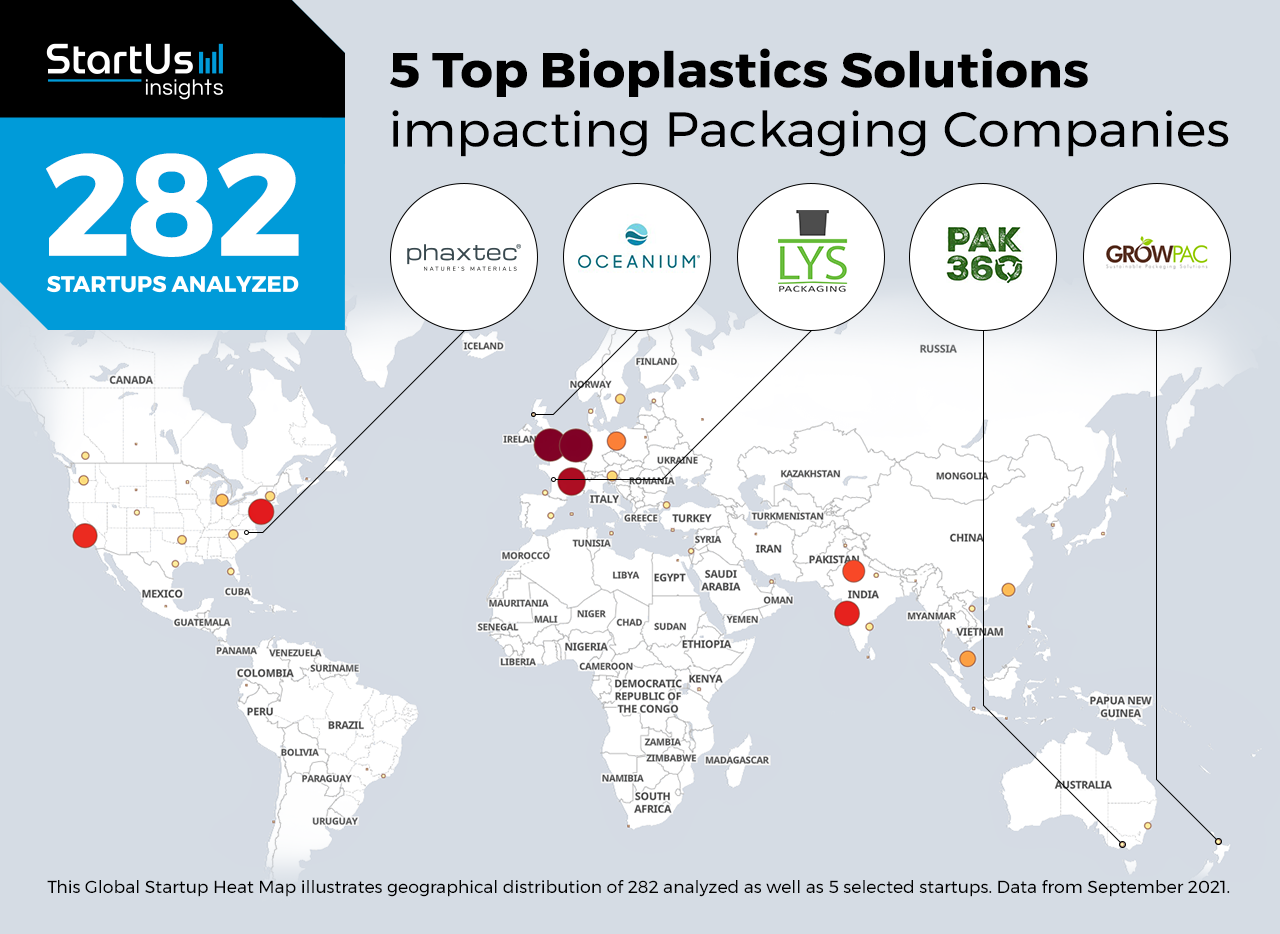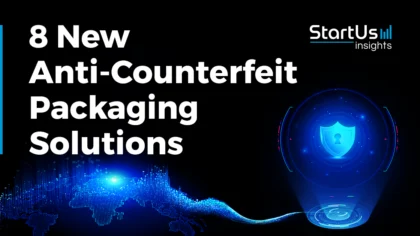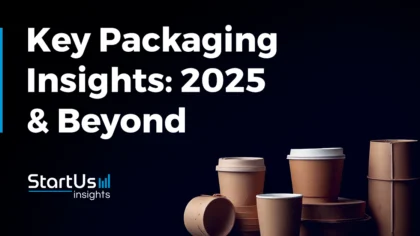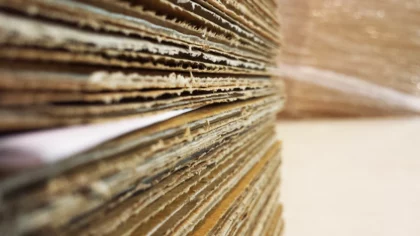Staying ahead of the technology curve means strengthening your competitive advantage. That is why we give you data-driven innovation insights into the packaging industry. This time, you get to discover 5 hand-picked startups developing bioplastics.
Global Startup Heat Map highlights 5 Top Bioplastics Solutions out of 282
The insights of this data-driven analysis are derived from the Big Data & Artificial Intelligence-powered StartUs Insights Discovery Platform, covering 2 093 000+ startups & scaleups globally. The platform gives you an exhaustive overview of emerging technologies & relevant startups within a specific field in just a few clicks.
The Global Startup Heat Map below reveals the distribution of the 282 exemplary startups & scaleups we analyzed for this research. Further, it highlights 5 bioplastics solutions that we hand-picked based on criteria such as founding year, location, funding raised, and more. You get to explore the solutions of these 5 startups & scaleups in this report. For insights on the other 277 bioplastics solutions for packaging companies, get in touch.
PHAXTEC develops Polyhydroxyalkanoates (PHA)
Plastic pollution, a large portion of which is packaging, is an exponentially rising threat to land and aquatic ecosystems. To tackle this, startups are developing a range of bioplastics or bio-based plastics. Polyhydroxyalkanoates, one of the most popular alternatives, are materials that bacteria naturally produce via fermentation. Unlike traditional plastics, PHA breaks down easily in land and aquatic environments.
US-based startup PHAXTEC produces sustainable PHA-based materials. The startup combines material science and biotechnology to create recyclable and compostable alternatives to traditional plastics. It uses biogas in its production process, further improving the sustainability of its materials. The startup’s solutions find applications in single-use packaging, paper coatings, and fabrics, among others.
GrowPac offers Starch-based Plastics
Bioplastic manufacturers use a variety of biomass feedstocks to produce bioplastics. This includes crops with a high density of compounds like starch, cellulose, and hemicellulose. However, cultivating crops for bioplastics manufacturing diverts arable land away from food production. This is why startups utilize agricultural byproducts and food waste to create starch-based and cellulose-based plastics.
GrowPac is a New Zealand-based startup that develops sustainable packaging solutions. It uses crops rich in starch, such as corn and sugarcane, to produce biodegradable bioplastic packaging. The startup’s food packaging keeps the food safe and fresh & is compostable along with any leftover food. GrowPac also offers product packaging and compostable bags for companies to lower their carbon footprint.
Pak360 provides Compostable Packaging
Plastic often ends up in landfills where it produces toxic leachates that make their way to water bodies. A major imperative for the development of bioplastics is to reduce the plastics ending up in landfills. This is why packaging startups are using compostable biomaterials to create novel bioplastics. Compostable packaging also simplifies the process of waste management as the packaging does not need to be separated from the waste.
Australian startup Pak360 makes compostable packaging from renewable fibers. The startup’s range of takeaway containers includes boxes, serving ware, boxes, and sample pots. It also offers other products, including carrying bags, food bags, and cutlery, among others. Pak360 collects packaging after use which allows it to compost them at scale.
LYS PACKAGING makes Vegan Bottles
Polyethylene terephthalate (PET) bottles are one of the most abundant kinds of plastic waste. Recycled PET (rPET), on the other hand, offers a more sustainable alternative but is not always biodegradable. That is why packaging startups are developing biodegradable alternatives to plastic bottles and other containers. Such solutions utilize vegetable fibers or food waste to create bio-based polymers.
French startup LYS PACKAGING manufactures a range of vegan bottles made from bioplastics. It uses plant-derived biopolymers for the production of bottles, flasks, and jars. The startup uses 3D printing and injection stretch blow molding (ISBM) to prototype and manufacture its products, respectively. By incorporating organic or vegetable co-products in the formulations, the startup varies the technical and visual properties of its bioplastics.
Oceanium works on Seaweed-based Packaging
In the public imagination, the impact of plastic pollution is most visible in the oceans. However, oceans also offer a solution to lower plastic waste. In recent years, the materials industry is turning to marine biomass as a renewable and ready source of different materials. This is why packaging startups are using seaweed and other algae to produce bioplastics.
Oceanium is a UK-based startup that develops seaweed-based packaging solutions. The startup sources seaweed from farmers and extracts valuable materials from it in its biorefinery. Its bioplastic, Ocean Ware, is a compostable material for products with no end-of-life solutions. Oceanium also extracts bioactives, proteins, and fibers for use in the health and food sectors.
Discover more Packaging Startups
Packaging startups such as the examples highlighted in this report focus on polyhydroxyalkanoates, starch-based plastics, compostable and seaweed-based packaging as well as vegan bottles. While all of these technologies play a major role in advancing the packaging industry, they only represent the tip of the iceberg. To explore more packaging technologies, simply get in touch to let us look into your areas of interest. For a more general overview, you can download our free Packaging Innovation Report to save your time and improve strategic decision-making.









